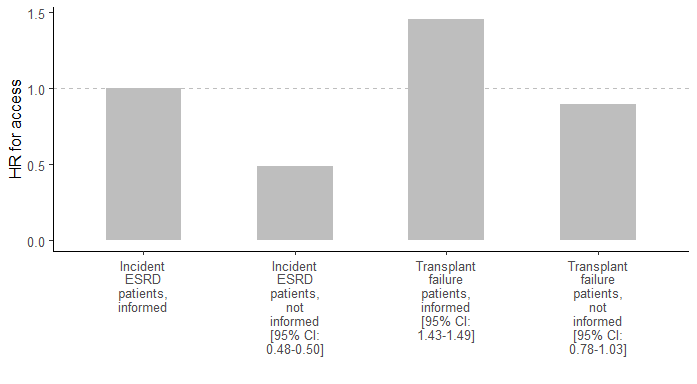Impact Of The Provision Of Transplant Information On Access To First And Repeat Kidney Transplantation
Nephrology, University of British Columbia, Vancouver, BC, Canada
Meeting: 2019 American Transplant Congress
Abstract number: A209
Keywords: Kidney transplantation, Multivariate analysis, Retransplantation, Waiting lists
Session Information
Session Name: Poster Session A: Kidney Deceased Donor Allocation
Session Type: Poster Session
Date: Saturday, June 1, 2019
Session Time: 5:30pm-7:30pm
 Presentation Time: 5:30pm-7:30pm
Presentation Time: 5:30pm-7:30pm
Location: Hall C & D
*Purpose: To determine whether the provision and relative impact of transplant information differs in incident ESRD patients and patients with a history of previous transplant failure.
*Methods: Incident ESRD patients and patients a history of a previous failure who initiated dialysis between 2005-2014 in the United States Renal Data System with a completed Center for Medicare and Medicaid Services 2728 form were studied. The association of the provision of transplant information in incident ESRD and failed transplant recipients with the outcome of access to transplantation (defined as placement on the deceased donor waiting list or living donor transplantation) was determined using a Cox multivariable regression model. The model adjusted for differences in patient characteristics including age, sex, race, cause of ESRD, BMI, and comorbid conditions.
*Results: 82% of the n = 789,404 incident ESRD and 96% of n= 21, 847 patients with previous transplant failure received transplant information. The provision of transplant information was associated with increased access to transplantation (Figure 1 and 2). The impact of transplant information on access was greater in incident ESRD patients (HR = 2.04 , 95 CI (2.01 -2.08)) compared to transplant failure patients (HR = 1.62, 95 CI (1.41- 1.84)). Nonetheless, incident ESRD patients provided transplant information had a lower likelihood of access to transplantation (HR = 0.69, 95 % CI (0.67 – 0.70)) compared to patients with transplant failure. Among patients who received transplant information and had access to transplantation, living donor transplantation was relatively more frequent in patients with previous transplant failure (29% versus 17%) – suggesting an opportunity to improve living donor transplant education in incident ESRD patients.
*Conclusions: The simple recording of transplant information on the Medevid Form does not provide sufficient information about the nature of the information provided. The differential impact of transplant information on access to transplant in incident patients and patients with previous transplant failure suggests this simple process measure may not result in uniformly effective information being provided to patients.
To cite this abstract in AMA style:
Clark S, Abdalla A, Kadatz M, Gill J, Gill JS. Impact Of The Provision Of Transplant Information On Access To First And Repeat Kidney Transplantation [abstract]. Am J Transplant. 2019; 19 (suppl 3). https://atcmeetingabstracts.com/abstract/impact-of-the-provision-of-transplant-information-on-access-to-first-and-repeat-kidney-transplantation/. Accessed March 5, 2026.« Back to 2019 American Transplant Congress


